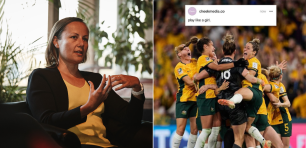
Image: HamZa NOUASRIA
This week the tech world lost John Warnock, the co-creator of the PDF and co-founder of Adobe. His original idea for what would eventually become Adobe PostScript was initially rejected by Xerox.
And this isn’t uncommon. In the startup ecosystem, plenty of great ideas are rejected. We hear this from founders constantly — dozens or even hundreds of ‘no’ answers before finally hitting a ‘yes’.
And it’s even happened to things that we can’t fathom ever being rejected, from people who are now worshipped in the business world.
Here are a few you may or may not know about.
In 1999 the founders of Google, Larry Page and Sergey Brin, wanted to sell the company to Excite CEO George Bell for $1 million. Even after being talked down to $750,000, Bell rejected the offer.
Just five months later the pair raised US$25 million. Today Alphabet Google’s market cap has eclipsed the billion mark, coming in at US$1.62 trillion.
Ring Doorbell
The Ring Doorbell began its life as Doorbot, which was crowdfunded back in 2013. A year later the founder of Ring, Jamie Siminoff, took the video doorbell system on the US iteration of Shark Tank. Smininoff asked for US$700,000 from the sharks but was rejected.
By 2018 the company had exploded in popularity and was acquired by Amazon for between US$1.2 to US$1.8 billion.
Canva
Canva co-founder Melanie Perkins has been upfront about the fact that the business was rejected by prospective investors over 100 times — and that their first pitch deck was “pretty terrible”.
However, the founders believed in the idea, and now Canva is one of the most widely used design tools in the world.
Ten years later the platform has raised $572.6 million across 15 funding rounds and has a market cap of around $24 billion.
Airbnb
Airbnb similarly saw its fair share of rejections.
Back in 2008, it was attempting to raise US$150,000 at a US$1.5 million valuation. As we reported here, five VCs rejected the startup and two didn’t reply at all.
Fast forward and as of 2020, Airbnb has raised US$6.4 billion in capital across 30 funding rounds with a US$80.26 billion market cap.
Nike Air
Back in 1977, a former aerospace engineer named M. Frank Rudy approached Adidas with the idea for a shoe. It contained an ‘air sole’ that promised more cushioning and support — something that would revolutionise the running shoe.
Adidas rejected the idea, and when Rudy brought the idea to Nike, co-founder Phil Knight almost did the same, dismissing it as “comic book stuff”.
However, after taking a prototype for a run, Knight changed his mind. Five years later Nike released the Air Force 1 model. To this day it remains one of the most popular sneakers in the world and sells millions of pairs every year.
Handpicked for you

Cheers to that: How prebiotic drink startup Blume secured national distribution to fight ‘Big Soda’



COMMENTS
SmartCompany is committed to hosting lively discussions. Help us keep the conversation useful, interesting and welcoming. We aim to publish comments quickly in the interest of promoting robust conversation, but we’re a small team and we deploy filters to protect against legal risk. Occasionally your comment may be held up while it is being reviewed, but we’re working as fast as we can to keep the conversation rolling.
The SmartCompany comment section is members-only content. Please subscribe to leave a comment.
The SmartCompany comment section is members-only content. Please login to leave a comment.